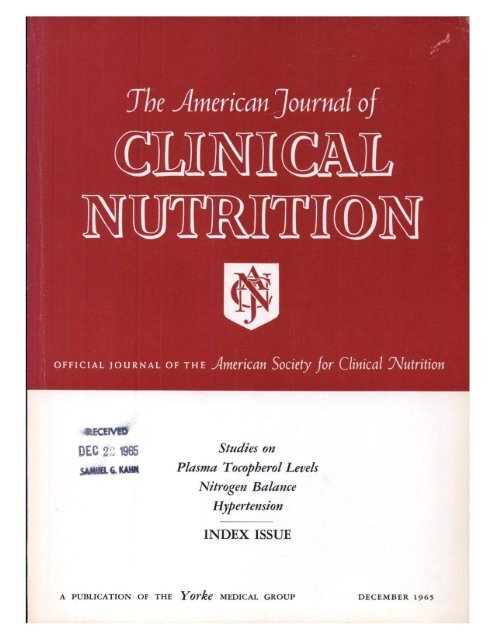Adulthood dietary and lifestyle patterns and risk of breast cancer: Global Cancer Update Programme (CUP Global) systematic literature review
IF 6.5
1区 医学
Q1 NUTRITION & DIETETICS
引用次数: 0
Abstract
Background
An increasing number of studies in recent years investigate various dietary and lifestyle patterns and associated breast cancer (BC) risk.
Objectives
This study aimed to comprehensively synthesize and grade the evidence on dietary and lifestyle patterns and BC risk.
Methods
Databases were systematically searched up to 31 March, 2022, for evidence from randomised controlled trials and prospective cohort studies on adherence to a dietary pattern alone or in combination with lifestyle behaviors and incidence of or mortality from primary BC in adult females. Findings in all, premenopausal, and postmenopausal females were descriptively synthesized instead of meta-analyzed due to patterns heterogeneity. An independent Global Cancer Update Programme Expert Panel graded the strength of the evidence.
Results
A total of 84 publications were included. Results for patterns reflecting both a healthy diet and lifestyle were more consistent than for patterns that included diet only. There was strong-probable evidence that a priori World Cancer Research Fund/American Institute for Cancer Research (WCRF/AICR) and American Cancer Society (ACS) dietary and lifestyle scores may reduce BC risk in all and postmenopausal females, whereas in premenopausal females, less evidence was found contributing to limited-suggestive grade. There was also a limited-suggestive evidence that adherence to the Healthy Lifestyle Index and other diet and lifestyle scores may reduce BC risk in postmenopausal females; a posteriori Western/Meat/Alcohol dietary patterns may increase BC risk in postmenopausal females; and Prudent/Vegetarian/Mediterranean dietary patterns may reduce BC risk in all females. For the remaining patterns, evidence was graded as limited-no conclusions.
Conclusions
Advice to adopt combined aspects of a healthy diet and lifestyle according to WCRF/AICR and ACS scores, encouraging a healthy weight, physical activity, alcohol and smoking avoidance, and a healthy diet rich in fruits, vegetables, (whole)grains and cereals and discouraging red and processed meat, can be proposed to females to lower BC risk.
This review was registered at PROSPERO as ID CRD42021270129 (https://www.crd.york.ac.uk/prospero/display_record.php?ID=CRD42021270129) on 28 August, 2021, and further updated on 4 May, 2022, in order to extend the search period.
成年期饮食和生活方式与乳腺癌风险:全球癌症更新计划(CUP Global)系统文献综述。
背景:近年来,越来越多的研究调查了各种饮食和生活方式与乳腺癌(BC)的相关风险:本研究旨在对有关饮食和生活方式与乳腺癌风险的证据进行全面综合和分级:方法:对截至 2022 年 3 月 31 日的数据库进行了系统检索,以获取有关成年女性单独或结合生活方式行为坚持某种饮食模式与原发性乳腺癌发病率或死亡率的 RCT 和前瞻性队列研究证据。由于模式的异质性,对所有女性、绝经前女性和绝经后女性的研究结果进行了描述性综合分析,而不是荟萃分析。一个独立的全球癌症更新计划专家小组对证据的强度进行了分级:结果:共纳入 84 篇出版物。与仅包括饮食的模式相比,同时反映健康饮食和生活方式的模式的结果更为一致。有很强的证据表明,世界癌症研究基金会/美国癌症研究所(WCRF/AICR)和美国癌症协会(ACS)的先验饮食和生活方式评分可降低所有女性和绝经后女性的BC风险,而对于绝经前女性,发现的证据较少,因此属于有限提示等级。还有有限提示性证据表明,坚持健康生活方式指数及其他饮食和生活方式评分可降低绝经后女性的乳腺癌风险;后天西式/肉类/酒精饮食模式可增加绝经后女性的乳腺癌风险;谨慎/素食/地中海饮食模式可降低所有女性的乳腺癌风险。其余饮食模式的证据有限,未得出结论:结论:可建议女性根据 WCRF/AICR 和 ACS 评分综合采用健康饮食和生活方式,鼓励健康体重、体育锻炼、避免酗酒和吸烟,以及富含水果、蔬菜、(全)谷物和谷类的健康饮食,不鼓励食用红肉和加工肉类,以降低 BC 风险。本综述于 2021 年 8 月 28 日在 PROSPERO 注册为 ID CRD42021270129 (https://www.crd.york.ac.uk/prospero/display_record.php?ID=CRD42021270129),并于 2022 年 5 月 4 日进一步更新,以延长检索期。
本文章由计算机程序翻译,如有差异,请以英文原文为准。
求助全文
约1分钟内获得全文
求助全文
来源期刊
CiteScore
12.40
自引率
4.20%
发文量
332
审稿时长
38 days
期刊介绍:
American Journal of Clinical Nutrition is recognized as the most highly rated peer-reviewed, primary research journal in nutrition and dietetics.It focuses on publishing the latest research on various topics in nutrition, including but not limited to obesity, vitamins and minerals, nutrition and disease, and energy metabolism.
Purpose:
The purpose of AJCN is to:
Publish original research studies relevant to human and clinical nutrition.
Consider well-controlled clinical studies describing scientific mechanisms, efficacy, and safety of dietary interventions in the context of disease prevention or health benefits.
Encourage public health and epidemiologic studies relevant to human nutrition.
Promote innovative investigations of nutritional questions employing epigenetic, genomic, proteomic, and metabolomic approaches.
Include solicited editorials, book reviews, solicited or unsolicited review articles, invited controversy position papers, and letters to the Editor related to prior AJCN articles.
Peer Review Process:
All submitted material with scientific content undergoes peer review by the Editors or their designees before acceptance for publication.

 求助内容:
求助内容: 应助结果提醒方式:
应助结果提醒方式:


